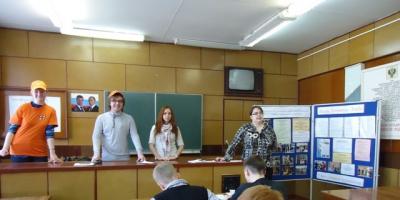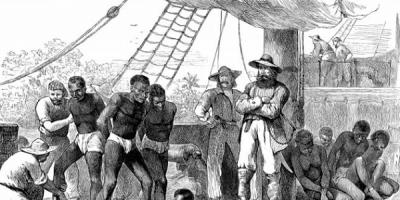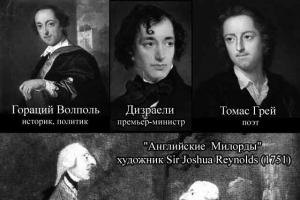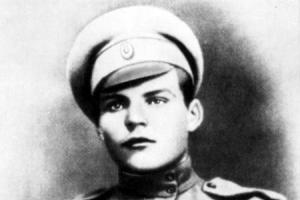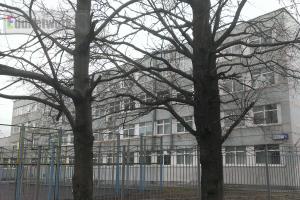◊ The rating is calculated based on points awarded over the last week
◊ Points are awarded for:
⇒ visiting pages dedicated to the star
⇒voting for a star
⇒ commenting on a star
Biography, life story of Alexander Alexandrovich Blok
The poet Blok was born in St. Petersburg in 1880 on November 16, he was the son of a law professor. Blok’s mother separated from her husband immediately after the birth of the boy. The child was raised in the family of his grandfather, who was the rector of St. Petersburg University, Beketov. Beketov Alexander Nikolaevich was a botanist by training. The mother married a second time, the family settled in the Grenadier barracks, since the stepfather was a guards officer. His last name was Kublitsky-Piottukh. Blok successfully graduated from high school and entered St. Petersburg University to study at the Faculty of Law. He soon realized that his interests were far from legal science and transferred to the Faculty of Philology, to the Slavic-Russian department. Alexander managed to study law for three years before becoming interested in philosophy and poetry.
The acquaintance with his future wife took place within the walls of the university; she was the daughter of the famous Mendeleev, a chemist. The young couple got married in 1903. Blok was in love with his wife. It was a feeling of rare strength, which is not given to everyone. Blok's first love also left a deep mark on his soul and poetry. The poet experienced his first love during his high school years at a resort in Baden-Baden, where the family vacationed in 1897. By 1901, the poet had already written many poems, these were lyrics about love, poems about nature. Blok's poetry was built on the idealistic ideas of Plato's philosophy; it was full of vague forebodings, hints and allegories. In poetry there was an unreal world of higher ideas; it was something sublime.
The relationship with his wife was contradictory and very difficult, since there was almost no physical intimacy between them. At this time, Blok became close to the Symbolists. There were two circles of symbolists - St. Petersburg and Moscow. In the first, Zinaida Gippius and Merezhkovsky reigned; in the second, in Moscow, Bryusov was the main figure. Alexander became close to the Moscow circle of admirers of the philosophy of Vl. Solovyov, Andrei Bely stood out among them. Bely was then an aspiring prose writer and poet, a theorist and connoisseur of new literature and new art. Andrei Bely's group greeted Blok's poems with delight. The Symbolist publishing house published the book “Poems about a Beautiful Lady.” Blok's wife became the object of Andrei Bely's crush, but he was rejected. However, family relationships became even more strained.
CONTINUED BELOW
The bloc began to gradually move away from the Symbolists back in 1905-1907, during the revolution. He turned to civil themes, at which time he wrote a drama for the Meyerhold Theater called "Balaganchik". During the period of war and revolution, Blok wrote many works in which he tried to comprehend the historical path of Russia from the point of view of the worldview of symbolism. Gradually, catastrophic motifs began to grow in his work, and he realized that the artistic language of the Symbolists was alien to him. Blok accepted the revolution as an element of purification, but no one understood or accepted his images. Blok became a professional writer around the years 1906-1908, when books began to be published one after another, but from that same time a discord with symbolism began to emerge. He finally took his own path in literature, drawing conclusions from his thoughts and doubts.
There was more than one woman in Blok’s life who influenced his poetry. Every period of biography became poetry. The history of the appearance of the “Carmen” cycle is connected with the feeling for Love Alexandrovna Delmas. Delmas was her stage name, after her mother's last name. Her real name was Tishinskaya. She was a famous singer who graduated from the St. Petersburg Conservatory. She sang romances to Blok's words at the Tenishevsky School, when everyone noticed that Blok and Delmas were strikingly suited to each other. Their feeling was “terribly serious.” She was a dazzling woman, but was she beautiful? Blok had a peculiar idea of female beauty; in fact, she was no longer a young, overweight woman. The cycles “Carmen”, “Harp and Violin”, “Grey Morning”, and the poem “The Nightingale Garden”, which Blok completed in 1915, were dedicated to her.
Having made interesting trips abroad, Blok published a cycle of the best poems in Russian poetry about Italy and many other wonderful works.
In the summer of 1916, Blok was drafted into the army, where he found information about the February Revolution of 1917. When the poet returned to Petrograd, he began to take part in the investigation of the crimes of the tsarist regime as part of the Extraordinary Commission. His book about these investigations was published posthumously. The last short creative upsurge occurred in 1918, when the poems “The Twelve” and “Scythians” were published. No one accepted or understood the image of Christ; the poem was perceived in very different ways. The revolutionaries were more lenient, but opponents of the revolution declared a real boycott of the poet.
In 1919, Blok was accused of an anti-Soviet conspiracy. He was interrogated for a long time, but Lunacharsky stood up. The poet was released, he began to try to cooperate with the authorities. Soon Blok felt the onset of a crisis of creativity; he realized that he would not have a place in the new literature. His physical condition had deteriorated greatly, he was on the verge of exhaustion, on the verge of life and death. He recently abandoned creativity and died of inflammation of the heart valves on August 7, 1921.
In the family of Alexander Lvovich Blok (1852-1909), professor of law at the University of Warsaw. Soon after the birth of the future poet, his parents separated.
In 1889-1898, A. A. Blok studied at the Vvedenskaya Gymnasium in, in 1898-1901 - at the Faculty of Law, in 1901-1906 - at the Slavic-Russian department of the Faculty of History and Philology of St. Petersburg University.
In 1903, A. A. Blok married L. D. Mendeleeva, the daughter of a famous Russian scientist.
Since 1903, A. A. Blok, who had been writing poetry since childhood, began publishing his works in print. The collection “Poems about a Beautiful Lady” (1904) secured the poet’s reputation as a symbolist lyricist. The revolutionary events of 1905-1907 brought into his lyrics a sense of the catastrophic nature of the era and a premonition of a brewing social storm (the cycle “On the Kulikovo Field”, 1908, sections of the cycle “Free Thoughts”, 1907, “Iambas”, 1907-1914).
The love lyrics of A. A. Blok are romantic and, along with delight and rapture, contain a fatal and tragic beginning (sections of the cycle “Snow Mask”, 1907, “Faina”, 1907-1908, “Retribution”, 1908-1913, “Carmen” , 1914). His mature poetry is freed from abstract mystical-romantic symbols and acquires vitality, concreteness, and features of plastic depiction (“Italian Poems”, 1909, the poem “The Nightingale Garden”, 1915, etc.).
Many ideas of A. A. Blok’s poetry were developed in his dramaturgy: the plays “Stranger”, “Balaganchik”, “King on the Square” (all in 1906), “Song of Fate” (1907-1908), “Rose and Cross” (1912- 1913).
The poetic fame of A. A. Blok was strengthened after the release of his collections “Unexpected Joy” (1906), “Snow Mask” (1907), “Earth in the Snow” (1908), “Lyrical Dramas” (1908), “Night Hours” ( 1911) and a collection of poems in 3 volumes (Musaget publishing house, 1911-1912).
From the beginning of the 1900s, A. A. Blok wrote critical and journalistic articles, essays, and speeches (“Colors and Words,” 1906, “Timelessness,” 1906, “On Lyrics,” 1907, “On the Theater,” “Letters” about poetry”, “People and intelligentsia”, “Elements and culture”, 1908, “Lightning of art”, 1909, “On the current state of Russian symbolism”, 1910, “The fate of Apollo Grigoriev”, 1916).
A. A. Blok met the February and October revolutions with mixed feelings. At the beginning of May 1917, he was hired by the “Extraordinary Commission of Inquiry to investigate the illegal actions of former ministers, chief managers and other senior officials of both civil, military and naval departments” as an editor. In August 1917, the poet began working on a manuscript, which he considered as part of the future report of the Extraordinary Commission of Inquiry. It was published in the magazine “Byloye” (No. 15, 1919) and in a separate publication under the title “The Last Days of Imperial Power” (1921).
In 1918, A. A. Blok created the poem “The Twelve,” the theme of which was the collapse of the old world and its collision with the new. The poem is built on semantic antitheses and sharp contrasts. The poem “Scythians” (1918) also revealed the poet’s views on the historical mission of the revolutionary.
In the last years of his life, A. A. Blok carried out extensive literary and social work: in the State Commission for the Publishing of Classics, in the Theater Department of the People's Commissariat for Education, in the Union of Workers of Fiction, in the publishing house "World Literature", in the Union of Poets. He gave reports, articles, speeches (“Catilina”, 1918, “The Collapse of Humanism”, 1919, “Heine in”, 1919, “On the Purpose of a Poet”, 1921, “Without God, Without Inspiration”, 1921).
A. A. Blok refused to emigrate for a long time, believing that he should be with him in difficult times. However, in the spring of 1921, in conditions of severe creative crisis, depression and progressive illness, the poet applied to the authorities for an exit visa, but was refused.
The last months of his life the poet was seriously ill. The permission to travel abroad was late and could no longer save him. On August 7, 1921, A. A. Blok died in his Petrograd apartment. He was buried at the Smolensk cemetery, and later reburied at the Volkovsky cemetery.
The work of A. A. Blok is connected with the traditions of poetry, A. A. Fet,. A. A. Blok is a romantic, the content of whose poetry was Russian reality and a real person.
Alexander Alexandrovich Blok. Born November 16 (28), 1880 in St. Petersburg, Russian Empire - died August 7, 1921 in Petrograd, RSFSR. Russian poet, classic of Russian literature of the 20th century, one of the greatest poets of Russia.
A. Blok's father is Alexander Lvovich Blok (1852-1909), lawyer, professor at the University of Warsaw.
Mother - Alexandra Andreevna, nee Beketova, (1860-1923) - daughter of the rector of St. Petersburg University A. N. Beketov. The marriage, which began when Alexandra was eighteen years old, turned out to be short-lived: after the birth of her son, she broke off relations with her husband and subsequently never resumed them. In 1889, she obtained a decree from the Synod on the dissolution of her marriage with her first husband and married guards officer F. F. Kublitsky-Piottukh, leaving her son the surname of her first husband.
Nine-year-old Alexander settled with his mother and stepfather in an apartment in the barracks of the Life Grenadier Regiment, located on the outskirts of St. Petersburg, on the banks of the Bolshaya Nevka. In 1889 he was sent to the Vvedensky gymnasium. In 1897, finding himself with his mother abroad, in the German resort town of Bad Nauheim, Blok experienced his first strong youthful love with Ksenia Sadovskaya. She left a deep mark on his work.
In 1897, at a funeral in St. Petersburg, he met Vl. Soloviev.
In 1898 he graduated from high school and entered the law faculty of St. Petersburg University. Three years later he transferred to the Slavic-Russian department of the Faculty of History and Philology, which he graduated in 1906. At the university, Blok meets Sergei Gorodetsky and Alexei Remizov.
At this time, the poet’s second cousin, later the priest Sergei Mikhailovich Solovyov (junior), became one of the closest friends of the young Blok.
Blok wrote his first poems at the age of five. At the age of 10, Alexander Blok wrote two issues of the magazine “Ship”. From 1894 to 1897, he and his brothers wrote the handwritten journal “Vestnik”.
Since childhood, Alexander Blok spent every summer on his grandfather’s Shakhmatovo estate near Moscow. 8 km away was the estate of Beketov’s friend, the great Russian chemist Dmitry Mendeleev Boblovo. At the age of 16, Blok became interested in theater. In St. Petersburg, Alexander Blok enrolled in a theater club. However, after his first success, he was no longer given roles in the theater.
In 1909, two difficult events occur in the Blok family: Lyubov Dmitrievna’s child dies and Blok’s father dies. To come to his senses, Blok and his wife go on vacation to Italy and Germany. For his Italian poetry, Blok was accepted into a society called the “Academy.” In addition to him, it included Valery Bryusov, Mikhail Kuzmin, Vyacheslav Ivanov, Innokenty Annensky.
In the summer of 1911, Blok again traveled abroad, this time to France, Belgium and the Netherlands.
In 1912, Blok wrote the drama “Rose and Cross”. K. Stanislavsky and V. Nemirovich-Danchenko liked the play, but the drama was never staged in the theater.
On July 7, 1916, Blok was called up to serve in the engineering unit of the All-Russian Zemstvo Union. The poet served in Belarus. By his own admission in a letter to his mother, during the war his main interests were “food and horses.”
Blok met the February and October revolutions with mixed feelings. He refused to emigrate, believing that he should be with Russia in difficult times. At the beginning of May 1917, he was hired by the “Extraordinary Commission of Inquiry to investigate illegal actions of former ministers, chief managers and other senior officials of both civil, military and naval departments” as an editor. In August, Blok began working on a manuscript, which he considered as part of the future report of the Extraordinary Investigative Commission and which was published in the magazine “Byloe” (No. 15, 1919) and in the form of a book called “The Last Days of Imperial Power” (Petrograd, 1921).
Blok immediately accepted the October Revolution enthusiastically, but as a spontaneous uprising, a rebellion.
At the beginning of 1920, Franz Feliksovich Kublitsky-Piottukh died from pneumonia. Blok took his mother to live with him. But she and Blok’s wife did not get along with each other.
In January 1921, on the occasion of the 84th anniversary of his death, Blok delivered his famous speech “On the Appointment of a Poet” at the House of Writers.
Blok was one of those artists in Petrograd who not only accepted Soviet power, but agreed to work for its benefit. The authorities began to widely use the poet’s name for their own purposes. During 1918-1920. Blok, often against his will, was appointed and elected to various positions in organizations, committees, and commissions. The constantly increasing volume of work undermined the poet's strength. Fatigue began to accumulate - Blok described his state of that period with the words “I was drunk.” This may also explain the poet’s creative silence - he wrote in a private letter in January 1919: “For almost a year now I have not belonged to myself, I have forgotten how to write poetry and think about poetry...”.
Heavy workloads in Soviet institutions and living in hungry and cold revolutionary Petrograd completely undermined the poet’s health - Blok developed serious cardiovascular disease, asthma, mental disorders, and scurvy began in the winter of 1920.
In the spring of 1921, Alexander Blok, together with Fyodor Sologub, asked to be issued exit visas. The issue was considered by the Politburo of the Central Committee of the RCP(b). Exit was denied. Lunacharsky noted: “We literally, without releasing the poet and without giving him the necessary satisfactory conditions, tortured him.” A number of historians believed that V. R. Menzhinsky played a particularly negative role in the fate of the poet, prohibiting the patient from going for treatment to a sanatorium in Finland, which, at the request of Lunacharsky, was discussed at a meeting of the Politburo of the Central Committee of the RCP (b) on July 12, 1921 of the year. Procured by L.B. Kamenev and A.V. Lunacharsky at the subsequent meeting of the Politburo, the permission to leave on July 23, 1921 was late and could no longer save the poet.
Finding himself in a difficult financial situation, he was seriously ill and died on August 7, 1921 in his last Petrograd apartment from inflammation of the heart valves. A few days before his death, a rumor spread throughout St. Petersburg that the poet had gone crazy. Indeed, on the eve of his death, Blok raved for a long time, obsessed with a single thought: had all the copies of “The Twelve” been destroyed? However, the poet died in full consciousness, which refutes rumors about his insanity. Before his death, after receiving a negative response to a request to go abroad for treatment (dated July 12), the poet deliberately destroyed his notes and refused to take food and medicine.
The poet was buried at the Smolensk Orthodox cemetery in Petrograd. The Beketov and Kachalov families are also buried there, including the poet’s grandmother Ariadna Alexandrovna, with whom he was in correspondence. The funeral service was held on August 10 (July 28, Art. Art. - the day of celebration of the Smolensk Icon of the Mother of God) in the Church of the Resurrection of Christ. In 1944, Blok’s ashes were reburied on the Literary Bridge at the Volkovskoye Cemetery.
Alexander Blok's height: 175 centimeters.
Personal life of Alexander Blok:
In 1903, Blok married Lyubov Mendeleeva, daughter, the heroine of his first book of poems, “Poems about a Beautiful Lady.”
It is known that Alexander Blok had strong feelings for his wife, but periodically maintained connections with various women: at one time it was the actress Natalya Nikolaevna Volokhova, then the opera singer Lyubov Aleksandrovna Andreeva-Delmas.
Lyubov Dmitrievna also allowed herself hobbies on the side. On this basis, Blok had a conflict with Andrei Bely, described in the play “Balaganchik”. Bely, who considered Mendeleeva the embodiment of a Beautiful Lady, was passionately in love with her, but she did not reciprocate his feelings.
After another hobby, Blok’s wife gave birth to a boy who lived only a few days. Despite the fact that this union was considered a laughing stock for all of St. Petersburg, it lasted until the poet’s death. After the First World War, relations in the Blok family improved, and in recent years the poet was the faithful husband of Lyubov Dmitrievna.

The poet's relatives live in Moscow, Riga, Rome and England. Until recent years, Alexander Blok’s second cousin, Ksenia Vladimirovna Beketova, lived in St. Petersburg. Among Blok’s relatives is the editor-in-chief of the magazine “Our Heritage” - Vladimir Enisherlov.
The boy was sent to the St. Petersburg Vvedenskaya Gymnasium, from which he graduated in 1898.
In 1898, Alexander Blok entered the Faculty of Law of St. Petersburg University, but in 1901 he transferred to the Faculty of History and Philology, from which he graduated in 1906 in the Slavic-Russian department.
From the beginning of the 1900s, Alexander Blok became close to the symbolists Dmitry Merezhkovsky and Zinaida Gippius in St. Petersburg, and with Valery Bryusov and Andrei Bely in Moscow.
In 1903, the first selection of Blok’s poems, “From Dedications,” appeared in the magazine “New Way”, headed by the Merezhkovskys. In the same year, a cycle of poems was published in the almanac “Northern Flowers” under the title “Poems about a Beautiful Lady” (the title was suggested by Bryusov).
The events of the revolution of 1905-1907 played a special role in shaping Blok’s worldview, revealing the spontaneous, catastrophic nature of existence. In the lyrics of this time, the theme of the “elements” became the leading one - images of a blizzard, blizzard, motifs of free people, vagrancy. The Beautiful Lady is replaced by the demonic Stranger, Snow Mask, and the schismatic gypsy Faina. Blok published in the symbolist magazines “Questions of Life”, “Scales”, “Pereval”, “Golden Fleece”, in the latter he led the critical department from 1907.
In 1907, Blok’s collection “Unexpected Joy” was published in Moscow, in St. Petersburg - the cycle of poems “Snow Mask”, in 1908 in Moscow - the third collection of poems “Earth in the Snow” and a translation of Grillparzer’s tragedy “Foremother” with an introductory article and notes. In 1908, he turned to the theater and wrote “lyrical dramas” - “Balaganchik”, “King in the Square”, “Stranger”.
A trip to Italy in the spring and summer of 1909 became a period of “revaluation of values” for Blok. The impressions he gained from this journey were embodied in the cycle “Italian Poems”.
In 1909, having received an inheritance after the death of his father, he was freed for a long time from worries about literary earnings and focused on major artistic plans. In 1910, he began working on the great epic poem "Retribution" (which was not completed). In 1912-1913 he wrote the play "Rose and Cross". After the publication of the collection "Night Hours" in 1911, Blok revised his five books of poetry into a three-volume collection of poems (1911-1912). During the poet's lifetime, the three-volume set was republished in 1916 and in 1918-1921.
Since the autumn of 1914, Blok worked on the publication of “Poems by Apollo Grigoriev” (1916) as a compiler, author of the introductory article and commentator.
In July 1916, during the First World War, he was drafted into the army and served as a timekeeper of the 13th engineering and construction squad of the Zemsky and City Unions near Pinsk (now a city in Belarus).
After the February Revolution of 1917, Blok returned to Petrograd, where, as an editor of verbatim reports, he became a member of the Extraordinary Investigative Commission to investigate the crimes of the tsarist government. The materials of the investigation were summarized by him in the book “The Last Days of Imperial Power” (1921).
The October Revolution causes a new spiritual rise of the poet and civic activity. In January 1918, the poems “The Twelve” and “Scythians” were created.
After “The Twelve” and “Scythians”, Alexander Blok wrote comic poems “for the occasion”, prepared the last edition of the “lyrical trilogy”, but did not create new original poems until 1921. During this period, the poet made cultural and philosophical reports at meetings of the Volfila - Free Philosophical Association, at the School of Journalism, wrote lyrical fragments “Neither Dreams nor Reality” and “Confession of a Pagan”, feuilletons “Russian Dandies”, “Fellow Citizens”, “Answer to the Question of red seal."
A huge amount of what he wrote was related to Blok’s official activities: after the October Revolution of 1917, for the first time in his life he was forced to seek not only literary income, but also public service. In September 1917, he became a member of the Theater and Literary Commission, from the beginning of 1918 he collaborated with the Theater Department of the People's Commissariat for Education, and in April 1919 he moved to the Bolshoi Drama Theater. At the same time, he worked as a member of the editorial board of the publishing house "World Literature" under the leadership of Maxim Gorky, and from 1920 he was chairman of the Petrograd branch of the Union of Poets.
Initially, Blok's participation in cultural and educational institutions was motivated by beliefs about the duty of the intelligentsia to the people. But the discrepancy between the poet’s ideas about the “cleansing revolutionary element” and the bloody everyday life of the advancing regime led him to disappointment in what was happening. In his articles and diary entries, the motif of the catacomb existence of culture appeared. Blok’s thoughts about the indestructibility of true culture and the “secret freedom” of the artist were expressed in his speech “On the Appointment of a Poet” at an evening in memory of Alexander Pushkin and in the poem “To the Pushkin House” (February 1921), which became his artistic and human testament.
In the spring of 1921, Alexander Blok asked to be given an exit visa to Finland for treatment in a sanatorium. The Politburo of the Central Committee of the RCP(b), at whose meeting this issue was discussed, refused to allow Blok to leave.
In April 1921, the poet's growing depression turned into a mental disorder accompanied by heart disease. On August 7, 1921, Alexander Blok died in Petrograd. He was buried at the Smolensk cemetery; in 1944, the poet’s ashes were transferred to the Literary Bridge at the Volkovsky cemetery.
Since 1903, Alexander Blok was married to Lyubov Mendeleeva (1882-1939), the daughter of the famous chemist Dmitry Mendeleev, to whom the cycle “Poems about a Beautiful Lady” was dedicated. After the poet’s death, she became interested in classical ballet and taught the history of ballet at the Choreographic School at the Kirov Opera and Ballet Theater (now the Vaganova Academy of Russian Ballet). She described her life with the poet in the book “Both true stories and fables about Blok and about herself.”
In 1980, in the house on Dekabristov Street, where the poet lived and died for the last nine years, the museum-apartment of Alexander Blok was opened.
In 1984, in the Shakhmatovo estate, where Blok spent his childhood and youth, as well as in the neighboring estates of Boblovo and Tarakanovo, Solnechnogorsk district, Moscow region, the State Museum-Reserve of D.I. Mendeleev and A.A. Blok.
The material was prepared based on information from open sources
Alexander Alexandrovich Blok. Passport photo. 1910s
"Poems about a beautiful lady"
In 1898, Alexander Blok entered the university and studied there for quite a long time, because he transferred from the Faculty of Law to the Faculty of Philology; Therefore, he received his diploma only in 1906, when he was already a famous poet. He began writing poetry very early. In 1900 he was already an original poet, both in style and in essence. At first his poems were not published. Only in 1903 several poems were published in Merezhkovsky's magazine New way. In 1904 they were published as a separate book called Poems about a beautiful lady. Blok always insisted that his poetry could only be truly understood and appreciated by those who sympathized with his mysticism. This statement is especially true when it comes to his first book. If the reader does not understand the mystical “background”, the poems will seem to him simply verbal music. To be understood, these verses must be interpreted. This, however, is not a very difficult task if you use Blok’s own article On the current state of Russian symbolism(1910) - his very important self-disclosure - and a detailed commentary by Andrei Bely in his wonderful Memories of Blok.
Poems about a beautiful lady- a mystical “love story” with the Person, whom Blok identified with the heroine Three visions Solovyov - Sophia, Divine wisdom, the female hypostasis of the Divine. Blok’s friends are mystics, and he himself always insisted that these Poetry is the most important part of his work, and although the average reader may prefer the powerful poetry of his third volume, these early Poetry, of course, are very interesting and biographically important. Despite the influence of Vladimir Solovyov (material) and Zinaida Gippius (metric form), they are quite original and stylistically strangely mature for a 20-22 year old. The main feature of this poetry is complete freedom from everything sensual and concrete. This is a vagueness of words that acts on the unprepared reader simply like verbal music. Like no other, this poetry answers Verlaine's rule: " de la musique avant toute chose"("music, music first of all!"). There is nothing in the world" plus vague et plus soluble dans l’air” (“more vague and more soluble in the air”) than this collection. Later in the play Stranger Blok forces the Poet (who is undoubtedly a self-parody) to read his poems to the sex in the tavern, and he makes his verdict: “It’s unclear, sir, but very sophisticated, sir!” Apart from a few initiates, the attitude of his then fans towards Blok was in many ways similar to the attitude of gender.
Block. Biography, lyrics. Video tutorial
The further popularity of his early poetry (contained in the first volume of his works) was precisely caused by the craze for poetry that would be as pure and free of content as music.
At first, only a few appreciated Blok’s poetry. Critics either did not pay attention to her, or treated her with ridicule and indignation, which was the common lot of symbolists. They began to read Blok much later. But literary circles immediately understood the significance of the new poet: Bryusov and Merezhkovsky received him very warmly. The younger Symbolists went even further in their enthusiasm: two young Muscovites, Andrei Bely and Sergei Solovyov (son of M. S. Solovyov) saw in his poetry a message close to their own spiritual mood. Blok became for them a prophet and seer, almost the founder of a new religion. These young mystics with ardent faith expected a new religious revelation, and Blok’s ethereal poetry seemed to them the Annunciation of a new era. In their Memories Bely describes the tense atmosphere of mystical expectation in which the young Bloks (the poet and his wife, L. D. Mendeleeva), himself and Sergei Solovyov lived in 1903–1904.
"Stranger"
But this did not last long. Poems about a beautiful lady were still being published, the Blocists were in complete ecstasy, when suddenly Blok’s visionary world changed dramatically. The “beautiful lady” refused her admirer. The world was empty for him, the skies were covered with clouds and darkened. Rejected by his mystical beloved, the poet turned to the earth. This turn made Blok more unhappy and probably a worse person than he was, but a greater poet. Only then did his poetry acquire universal interest and become understandable not only to a select few. She became more earthly, but at first his earth was not material. His sky-fed style, upon first contact with brute reality, immediately dematerialized it. His world in 1904-1906. - a curtain of mirages thrown over a more real, but invisible heaven. His style, ethereal and purely musical, was perfect for depicting the fogs and mirages of St. Petersburg, an illusory city that disturbed the imagination of Gogol, Grigoriev, and Dostoevsky. This romantic Petersburg, a dream emerging in the unreal hazy atmosphere of the northern Neva swamps, became the basis of Blok’s poetry as soon as he touched the ground after his first mystical flights. "Beautiful Lady" disappears from his poems. She is replaced by the Stranger, also immaterial, but a passionate, ever-present vision with which he is obsessed throughout the entire second volume (1904–1908). It appears with particular clarity in the poet’s most famous poem (perhaps after Twelve the most famous), written in 1906, characterized by a combination of realistic irony and romantic lyricism. The poem begins with a grotesque and ironic image of a summer cottage near St. Petersburg. In this den of seething vulgarity, where “tested wits” walk with ladies and “drunkards with rabbit eyes in wine veritas they scream,” the Stranger appears (see the full text and analysis of this poem).
...And every evening, at the appointed hour
(Or am I just dreaming?),
The girl's figure, captured by silks,
A window moves through a foggy window.
And slowly, walking between the drunken,
Always without companions, alone,
Breathing spirits and mists,
She sits by the window.
And they breathe ancient beliefs
Her elastic silks
And a hat with mourning feathers,
And in the rings there is a narrow hand.
And chained by a strange intimacy,
I look behind the dark veil,
And I see the enchanted shore
And the enchanted distance.
Silent secrets have been entrusted to me,
Someone's sun was handed to me,
And all the souls of my bend
Tart wine pierced.
And ostrich feathers bowed
My brain is swinging,
And blue bottomless eyes
They bloom on the far shore.
There's a treasure in my soul
And the key is entrusted only to me!
You're right, drunken monster!
I know: the truth is in the wine.
Block. Lyrics. Second volume. Video tutorial
"Bubbles of the Earth"
A whole series of charming poems dates back to the same period, where Blok demonstrates an unexpected gift for cozy and playful humor. It is named after a quote from Macbeth – Earth Bubbles. These are poems about simple playful spirits living in fields and forests. Few of Blok's poems have won more sympathy for him than Swamp priest, mysterious, mischievous, good-natured, created by his imagination, who, towering a finger, stands on a hummock
And quietly prays
Raising my hat
For the stem that bends,
For a sick animal paw,
And for the Pope.
Blok and the Revolution of 1905
Like most symbolists, Blok welcomed revolution of 1905. He joined the mystical anarchists. Once he even carried a red flag. The degeneration of the revolution into anarchy and collapse intensified his pessimism, and feelings of hopelessness and despondency took possession of his soul. His poetry became forever an expression of the “fatal emptiness” (which he speaks of in poems of 1912), familiar to many people of his generation. This “emptiness” is akin to what Leonid Andreev experienced. The difference is that Blok is a genius and a man of incommensurable culture and that he knew a state of mystical bliss that Andreev did not even suspect about.
Blok's dramas
The impotent desire to return to the Radiant Presence from which he had been expelled, and the bitter resentment at how the “Beautiful Lady” treated him, became the plot of his “lyrical dramas” written in 1906-1907. – Showcase And Strangers, which can be considered among his earliest and most enchanting masterpieces. Showcase- harlequinade. It was staged in 1907 and ran for quite a long time. He made an unforgettable impression on those who saw him. It contains a lot of Blok’s best lyrics, but essentially it is a satire, a parody, and, moreover, a darkly blasphemous one. This is a parody of Blok’s own mysticism and a satire of his own hopes and expectations. His friends - Bely and Sergei Solovyov - perceived this not only as an insult to themselves, but also as an insult to their common faith in Sophia - Divine Wisdom. This entailed the alienation of his Moscow friends from Blok, and the next period became for him a time of gloomy loneliness. For most readers, terrible pessimism Showcase hidden behind its lyrical charm and capricious symbolism. But in fact, this is one of the darkest and most blasphemous plays ever written by a poet anywhere.
For an analysis of the drama “The Stranger”, see a separate article on our website. From then on, Blok’s work was filled with wine, women and gypsy songs - and all this against the backdrop of passionate despair and hopeless longing for the forever lost vision of the “Beautiful Lady”. Passionate and hopeless disappointment - this is now the atmosphere of Blok’s poetry. Only occasionally is he pulled out of constant despondency by a whirlwind of earthly passion. Such a whirlwind affected the cycle Snow mask; This ecstatic, lyrical fugue was written in the early days of 1907.
The third volume of Blok's lyrics
Blok's genius reaches maturity by 1908. Poems written over the next eight years were included in the third volume, which, together with the poem Twelve is undoubtedly the largest of what has been created by the Russian poet over the past eighty years. Blok was not a man of great intelligence or great moral strength. He was not, in essence, a great master. His art is passive and involuntary. He is more a recorder of poetic experience than a builder of poetic buildings. What makes him great is the presence of an overwhelming poetic spirit, as if appearing from other worlds. He himself described his creative process in one of his most remarkable poems - Artist(1913) as a completely passive state, very close to the mystical ecstasy as described by the great Western (Spanish and German) mystics. Ecstasy is preceded by a state of melancholy boredom and prostration; then comes an inexplicable bliss from the wind blowing from other spheres, to which the poet surrenders weakly and obediently. But ecstasy is hampered by the “creative mind,” which forcibly imprisons the “light, kind, free bird”—the bird of inspiration—in the shackles of form; and when the work of art is ready, then for the poet it is dead, and he again falls into his former state of devastated boredom.
Block. Lyrics. Third volume. Video tutorial
In the third volume, Blok's style pulsates more fully and powerfully than in his earlier works. It is more intense and full-blooded. But, as in early things, it depends heavily on the subtlest, subtlest features of language, sound, associations. Dejection and despair expressed in a poem dating to this time Dance of Death, are characteristic of most of Blok’s poems after 1907.
Blok's theme of Russia
But sometimes, for a while, it seems that Blok has discovered for himself some kind of ray of hope that will replace “The Beautiful Lady” - and this is love for Russia. It was a strange love, perfectly aware of the vile and base traits of the beloved and yet sometimes reaching real paroxysms of passion. The image of Russia became identified in his imagination with the Stranger - the mysterious woman of his dreams - and with the passionate, divided women of Dostoevsky: Nastasya Filippovna ( Idiot) and Grushenka ( Brothers Karamazov). Another symbol and mystical reflection of Russia is the blizzard, the blizzard, which in Snow mask was a symbol of cold and burning storms of carnal passion and which becomes the main background of the poem Twelve. The Russian wind of passions is again associated with the gypsy choirs of Moscow and St. Petersburg. Even before Blok, many great Russian writers (including Derzhavin, Tolstoy and Leskov) knew the charm and splendor of gypsy choirs. In the mid-nineteenth century there lived a brilliant and not fully manifested poet Apollo Grigoriev, whose soul was filled with gypsy poetry. He wrote several extraordinary songs that were appropriated by the gypsies, although they forgot the very name of Apollo Grigoriev. Blok practically discovered Grigoriev the poet (he was well known as a critic) and “raised him.” He published a collection of poems by Grigoriev (1915), to which he wrote a preface - one of the few prose articles worthy of the great poet. In it he nobly pays tribute to his forgotten predecessor.
Blok’s love for Russia was expressed in an acute feeling of its destinies, which sometimes reached the point of a truly prophetic gift. In this regard, the lyrical fugue On the Kulikovo field(1908) is particularly noteworthy: it is full of gloomy, ominous forebodings of the coming catastrophes of 1914 and 1917. Another remarkable poem (written in August 1914) fully reveals this strange love for one's country. They begin with the words:
Sin shamelessly, restlessly,
Losing count of the nights and days,
And, with a head heavy with drunkenness,
Walk aside into God's temple.
Yes, and so, my Russia,
You are dearer to me from all over the world.
It is impossible to talk in detail about all of Blok’s poems written between 1908 and 1916. It will be enough to name a few unforgettable masterpieces, such as Humiliation(1911) – about the humiliation of corrupt love; Commander's steps(1912), one of the best poems of retribution ever written; a terrible cry of despair - Voice from the choir(1914); And Nightingale Garden, in style “more classical” and stricter than most of his lyric poems, a symbolic poem that unexpectedly brings to mind another great symbolic poem - My life Chekhov.
"Retribution"
In addition to lyric poems, the third volume includes two larger works of the same time: the poem Retribution and lyrical tragedy Rose and cross.
Retribution was started in 1910 under the impression of the death of his father. According to the plan, it was supposed to consist of three parts, but only the first was completely completed. In style it is realism, an attempt to approach the method of Pushkin and Lermontov. This is the story of his father and himself, and Blok intended to create a thing of great significance, illustrating the laws of heredity and showing the progressive decay of the old regime in Russia. He failed to cope with this task, and overall the poem was not a success. However, there are strong and beautiful parts in it. The beginning of the second chapter reveals Blok's unexpected gift of broad historical vision: this is a magnificent synthetic sketch of Russian life under Alexander III, which could be quoted in all Russian history textbooks.
In the same month when they were written Twelve(January 1918), Blok wrote Skifov(see full text and analysis), a tense rhetorical invective against Western peoples who do not want to conclude the peace proposed by the Bolsheviks. This is very eloquent, but not very clever, and in any case much lower in level than Twelve.
This was Blok's last poem. The new government, which valued its few intelligent allies, kept Blok busy, and for three whole years he worked on all sorts of cultural and translation endeavors, led by Gorky and Lunacharsky. After Twelve his revolutionary enthusiasm subsided and was replaced by passive despondency, where even the wind of inspiration did not penetrate. He tried to continue working on Retribution, but nothing came of it. He was dead tired - and empty.
Unlike many other writers, he did not suffer from hunger and cold because the Bolsheviks took care of him, but he was dead long before his death. This is the impression that everyone who remembers Blok had at this time. However, the attitude of the communist authorities towards him was not always friendly. In February 1919, Blok was arrested by the Petrogradskaya Cheka on charges of counter-revolutionary conspiracy. A day later, after two long interrogations, Blok was released, as Lunacharsky stood up for him. However, even these one and a half days in prison broke him. He died of heart disease on August 9, 1921. Twelve glorified him more than all the previous ones, but leftist literary schools in the last years of Blok’s life unanimously overthrew him. His death was the signal for his recognition as one of the nation's greatest poets.
There is and cannot be any doubt that Blok is a great poet. But for all his greatness, he is undoubtedly an unhealthy, sickly poet, the greatest and most typical representative of a generation whose best sons were stricken with despair and, unable to overcome their pessimism, either fell into a dangerous and ambiguous mysticism, or found oblivion in a whirlwind of passions.

